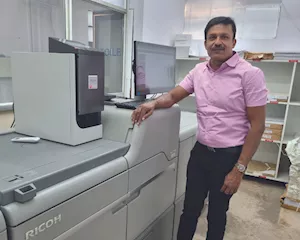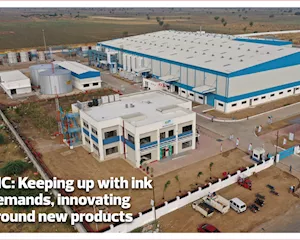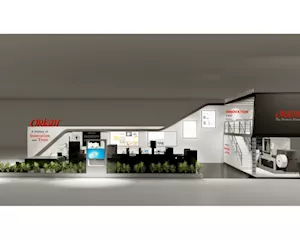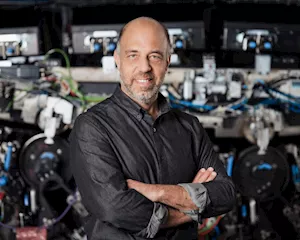Mihir's Impressions
Mihir Joshi looks at MeadWestvaco, smart cards in UP, barcodes and Google's anti-print policy
12 Jan 2013 | By Mihir Joshi
MeadWestvaco plans a massive expansion in Gujarat
US-based global packaging solutions provider MeadWestvaco is set to expand its Indian operations in tune with the predicted boom in modern retail growth in India.
According to MeadWestvaco’s analyst the Indian packaging market has immense potential and scope for growth is equally huge. The per capita consumption of packaging in China is $40, $100 in Brazil; $400 in the US or EU and about $10 in India.
MWV bought a small corrugated packaging company in Pune called Wadco in 2008 and in November, 2012, it purchased Gujarat-based packaging maker Ruby Macons and is about to significantly expand its factory located in Vapi.
John A Luke Jr, chairman and CEO of MeadWestvaco, is leading a team of American businessmen headed to Vibrant Gujarat, a meeting for investors. "Vibrant Gujarat fits nicely with the timing of our strategic move in the state," he says.
UP to issue smartcard driving licenses
Uttar Pradesh chief minister Akhilesh Yadav has announced the launch of smart card drivers’ licenses in certain regions of Uttar Pradesh.
Under this program, smart card-based drivers’ licenses will include a biometric thumbprint as well as digital signatures. Applicants will have to be registered in-person at the transport office.
This new license will be made of plastic and will be embedded with a microprocessor chip with 64KB of on-board memory, which will contain the biometric details of the driver.
Uttar Pradesh joins a host of states in shunning the booklet format for a smartcard for driver's license.
Barcode provides lessons for emerging technology
Almost everything that we purchase from clothes to packed food, from razor blades to big electronic appliances everything in today’s day and age has a barcode. And with the arrival of Unique Identification Cards and the apparent need to identify every person in the country.
Ubiquitous nature of barcodes in modern civilisation is due to its immense useful in tracking and storing data. Many industries have enthusiastically adopted the barcodes; none has been more enthusiastic in adoption of barcodes than the retail industry. Almost every item other than fresh produce from a grocery store, department store, and mass merchandiser has a unique product code barcode on it.
A barcode simply identifies an object by associating a number to it, which in turn is corresponding to information about the product that is stored in a database. A barcode when decoded or read through a barcode scanner will provide you vital information regarding the product.
The phenomenal success of the barcode holds valuable lessons on how emerging technologies achieve dominance and how to tap in to them and enjoy a sliver of their success.
1. Simplicity and reliability that overcomes habit: The bar codes are very reliable, and a lot of work went into that, it built upon the existing Morse code and extended those codes in to lines. Until the late 1970s, every clerk in every supermarket tapped numbers onto a register keypad. The process was rife with errors, yet it was the way retail functioned. Only a simple technology with obvious benefits could overcome that inertia.
2. A governing body to establish standards: If every supermarket and potato chip maker had chosen its own product-information technology, chaos would have ensued. Instead, a consortium of retailers and manufacturers got together and chose the unique product code, IBM’s barcode system. Thus standardisation propelled a very effective system.
3. An extravagant, surprising, and often expensive effort to seed the market:
For barcodes, the seeding of the market followed the rise of retail goliaths like Wal-Mart, which used the codes to create its legendarily efficient distribution system. The success of this seeding was due to the efficiency of the invention and standardisation. But without the seeding it is hard to imagine the success.
Two Sides take on Google and its anti-print policy
Two Sides, an organisation created to improve industry standards in the print and paper industry has slammed search giants Google for "spurious" and "self-interested" environmental claims in its anti-paper campaign.
Google along with HelloFax, an online fax service; Manilla, an online bill management service; HelloSign, an e-signature service; Expensify, an online expense reporting service; Xero, an online business accounting service; and Fujitsu, which makes the ScanSnap scanner are spear-heading 'Paperless 2013'. Just a customary glance at the list of companies is enough to see that this so-called environmental initiative is a masked propaganda against an industry which is a direct competition to them.
The international arm of Two Sides has now taken the fight to Google with an open letter designed to correct its "unattributed environmental claims" and persuade it to abandon Paperless 2013.
The letter accused Google of having an "astounding" environmental impact, and said its data centre usage accounted for about 2% of the US's annual electricity consumption.
"[This] new initiative is clearly another example of a self-interested organisation using an environmentally focused marketing campaign to promote its services while ignoring its own impact upon the environment," said the letter.
Two Sides said printed documents could be more environmentally friendly than their electronic equivalents if read more than once or by several people.
It also noted that while electronic waste was a growing scourge, the timber used to make paper was a sustainable resource.
"So, before encouraging people to go paperless, and particularly inferring that electronic services are better for the environment, Google and others need to examine their own impacts and perhaps might reflect that, on balance, print and paper can be a sustainable way to communicate," said the letter.
"In reality we live in an increasingly digital world and electronic and paper-based communication co-exist.
"Each has environmental impacts and it would be helpful, and more honest with consumers, if organisations would not try to differentiate their products and services on the basis of spurious and unattributed environmental claims."
Mihir Joshi, besides being a PrintWeek India scribe, is a central defender and supporter of AC Milan. In his weekly column he immortalises the power of print with the same passion with which he gets excited about the world's greatest game.














 See All
See All